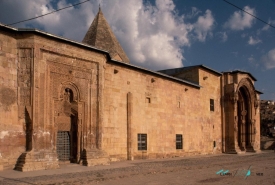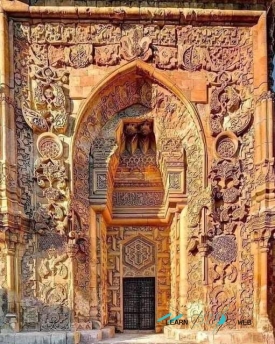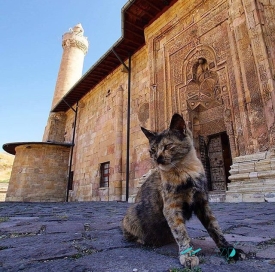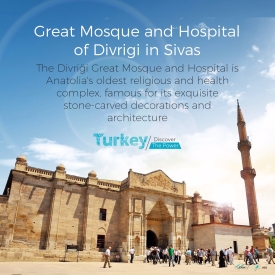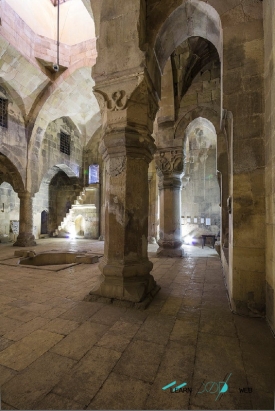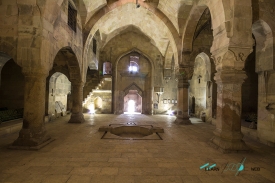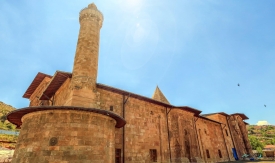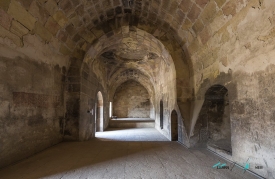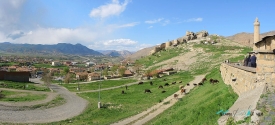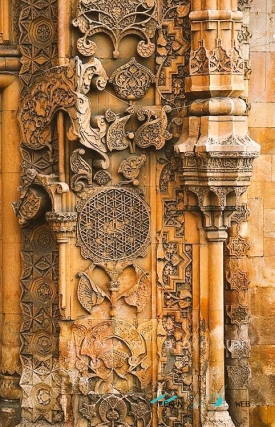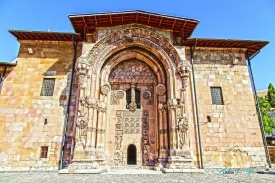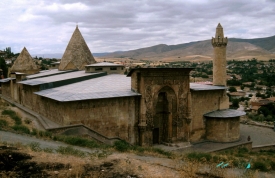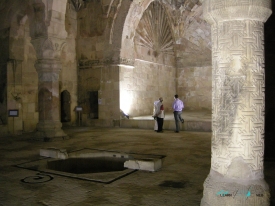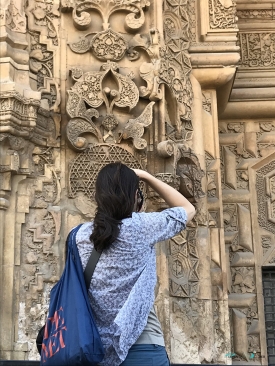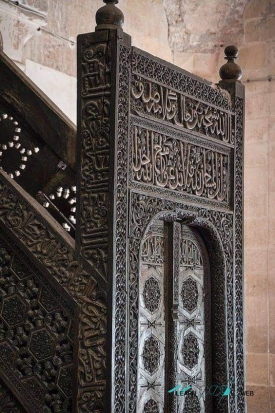The Great Mosque and Hospital of Divriği, is an architectural complex consisting of five buildings, located in the Divriği district of Sivas, in a settlement whose history dates back to the times of the Hittites, 2 thousand years before the Christian era.
In the Great Mosque Ensemble, which was included in the World Heritage List in 1985, several inscriptions are preserved throughout the complex, an important source of information about its builders. According to inscriptions, the mosque was built in 1228-29, by Ahmed Shah, ruler of the Mengücek Emirate, close to the Seljuks of Anatolia. The dependence of the small emirate on the Seljuk empire is realized in the inscriptions on the walls, praising the Seljuk sultan of Rüm, Kaikubad I.
The inscription on the hospital portal describes the building as a dār al-shifā' ("house of healing") and attributes its foundation to Tūrān Malik bint ("daughter of") Fakhr al-Dīn Bahramshāh.
Also the inscriptions tell that the hospital was built by the architect: “Hürrem Şhah, son of Mughis of Ahlat, by Turan Melek, the daughter of Fahreddin Behramşah, his wife and lord of Erzincan. In the window of the east facade of the mosque the painter Ahlatlı Ahmed, in the pulpit Ahmed, son of İbrahim and calligrapher Mehmed from Tbilisi, and in the verse strip on the south wall of the mosque…”
The extremely vivid vegetal and geometric decorations on the portals, in the minbar and inside the hospital represent a synthesis of the Seljuk and Christian-Armenian building traditions. The entire complex can be seen from afar, from the outskirts of the city and is one of the most important medieval buildings in Anatolia.
The Divriği Grand Mosque and Hospital consists of five naves perpendicular to the mihrab. The central nave is wider than the others. The dome in front of the mihrab cut here is covered with a pyramidal shell that resembles a dome from the outside, and has become dominant over the mosque from the outside. There is a skylight in the central nave. Turkish fan-shaped triangles were used in the transition to the skylight dome. All the naves of the mosque are covered with starry vaults that are different from each other. It is possible to see both the Seljuk courtyard plant type and the Umayyad plant type together in this mosque.
The complex is an original work, unique, in the Muslim world, in terms of structure and decoration. The decorations of the three portals, which have no stylistic unity among them, are different from each other. The ornaments, including the motif of a double-headed eagle, are extremely overflowing and baroque in character. On the western portal, there is the double-headed eagle, which is the emblem of Alaaddin Keykubad, and the birth motif of Ahmet Shah's coat of arms.
Divriği is located in the east of the Anatolian peninsula. The route of the Silk Road and the Persian Royal Road run through this region, hence its importance for centuries. According to written historical sources, the region of Sivas province was first inhabited during the period of the Hittite civilization in early 2000 BC. and became an important settlement. The region has been a place of convergence of civilizations, such as the Armenian, Roman, Byzantine, Seljuk and Ottoman.
The mosque and the hospital owe their design to the artistic sense of various Mengücek rulers, who were able to maintain their small principality (Beylik) for nearly 100 years, maintaining friendly relations with empires such as the Seljuks. The founder of the Mengücek dynasty, he probably came to Anatolia as a Turkish military leader in the service of the Seljuk ruler Alp Arslan and was charged with securing the conquered area, achieving his mission by defeating the Byzantine troops at the Battle of Manzikert in 1071. Mengücek's power base was primarily in Kemah from around 1080, his territory spanning the upper Euphrates between Divriği further west and Erzincan in the east. After the death of his successor Malik İshak, his three sons were assigned the three main cities as independent domains.
In the Great Mosque Ensemble, which was included in the World Heritage List in 1985, several inscriptions are preserved throughout the complex, an important source of information about its builders. According to inscriptions, the mosque was built in 1228-29, by Ahmed Shah, ruler of the Mengücek Emirate, close to the Seljuks of Anatolia. The dependence of the small emirate on the Seljuk empire is realized in the inscriptions on the walls, praising the Seljuk sultan of Rüm, Kaikubad I.
The inscription on the hospital portal describes the building as a dār al-shifā' ("house of healing") and attributes its foundation to Tūrān Malik bint ("daughter of") Fakhr al-Dīn Bahramshāh.
Also the inscriptions tell that the hospital was built by the architect: “Hürrem Şhah, son of Mughis of Ahlat, by Turan Melek, the daughter of Fahreddin Behramşah, his wife and lord of Erzincan. In the window of the east facade of the mosque the painter Ahlatlı Ahmed, in the pulpit Ahmed, son of İbrahim and calligrapher Mehmed from Tbilisi, and in the verse strip on the south wall of the mosque…”
The extremely vivid vegetal and geometric decorations on the portals, in the minbar and inside the hospital represent a synthesis of the Seljuk and Christian-Armenian building traditions. The entire complex can be seen from afar, from the outskirts of the city and is one of the most important medieval buildings in Anatolia.
The Divriği Grand Mosque and Hospital consists of five naves perpendicular to the mihrab. The central nave is wider than the others. The dome in front of the mihrab cut here is covered with a pyramidal shell that resembles a dome from the outside, and has become dominant over the mosque from the outside. There is a skylight in the central nave. Turkish fan-shaped triangles were used in the transition to the skylight dome. All the naves of the mosque are covered with starry vaults that are different from each other. It is possible to see both the Seljuk courtyard plant type and the Umayyad plant type together in this mosque.
The complex is an original work, unique, in the Muslim world, in terms of structure and decoration. The decorations of the three portals, which have no stylistic unity among them, are different from each other. The ornaments, including the motif of a double-headed eagle, are extremely overflowing and baroque in character. On the western portal, there is the double-headed eagle, which is the emblem of Alaaddin Keykubad, and the birth motif of Ahmet Shah's coat of arms.
Divriği is located in the east of the Anatolian peninsula. The route of the Silk Road and the Persian Royal Road run through this region, hence its importance for centuries. According to written historical sources, the region of Sivas province was first inhabited during the period of the Hittite civilization in early 2000 BC. and became an important settlement. The region has been a place of convergence of civilizations, such as the Armenian, Roman, Byzantine, Seljuk and Ottoman.
The mosque and the hospital owe their design to the artistic sense of various Mengücek rulers, who were able to maintain their small principality (Beylik) for nearly 100 years, maintaining friendly relations with empires such as the Seljuks. The founder of the Mengücek dynasty, he probably came to Anatolia as a Turkish military leader in the service of the Seljuk ruler Alp Arslan and was charged with securing the conquered area, achieving his mission by defeating the Byzantine troops at the Battle of Manzikert in 1071. Mengücek's power base was primarily in Kemah from around 1080, his territory spanning the upper Euphrates between Divriği further west and Erzincan in the east. After the death of his successor Malik İshak, his three sons were assigned the three main cities as independent domains.



